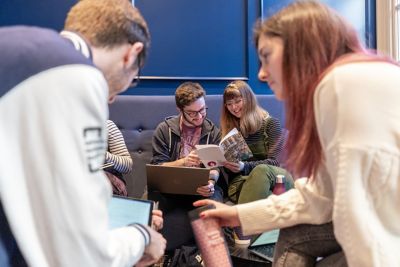Study abroad
On this course, you can apply to study abroad at one of our partner institutions or at University of Nottingham China or University of Nottingham Malaysia.
If you are successful in applying to study abroad, you will get the opportunity to broaden your horizons and enhance your CV by experiencing another culture. Teaching is typically in English, but there may be opportunities to study in another language if you are sufficiently fluent.
You can choose to study similar modules to your counterparts in the UK or expand your knowledge by taking other options.
The school you are joining may also have additional study abroad options available. Please visit the school website for more information.
Please note: In order to study abroad you will need to achieve the relevant academic requirements as set by the university and meet the selection criteria of both the university and the partner institution. The partner institution is under no obligation to accept you even if you do meet the relevant criteria.
Optional placement year
If your course does not have a compulsory placement, integrated year in industry or compulsory year abroad where there is already an opportunity to undertake a work placement as part of that experience, you may be able to apply to undertake an optional placement year. While it is the student’s responsibility to find and secure a placement, our Careers and Employability Service will support you throughout this process. Contact placements@nottingham.ac.uk to find out more.
The school/faculty you are joining may also have additional placement opportunities. Please visit the school/faculty website for more information.
Please note: In order to undertake an optional placement year, you will need to achieve the relevant academic requirements as set by the university and meet any requirements specified by the placement host. There is no guarantee that you will be able to undertake an optional placement as part of your course.
Key information
Please be aware that study abroad, compulsory year abroad, optional placements/internships and integrated year in industry opportunities may change at any time for a number of reasons, including curriculum developments, changes to arrangements with partner universities or placement/industry hosts, travel restrictions or other circumstances outside of the university’s control. Every effort will be made to update this information as quickly as possible should a change occur.
Study abroad
On this course, you can apply to study abroad at one of our partner institutions or at University of Nottingham China or University of Nottingham Malaysia.
If you are successful in applying to study abroad, you will get the opportunity to broaden your horizons and enhance your CV by experiencing another culture. Teaching is typically in English, but there may be opportunities to study in another language if you are sufficiently fluent.
You can choose to study similar modules to your counterparts in the UK or expand your knowledge by taking other options.
The school you are joining may also have additional study abroad options available. Please visit the school website for more information.
Please note: In order to study abroad you will need to achieve the relevant academic requirements as set by the university and meet the selection criteria of both the university and the partner institution. The partner institution is under no obligation to accept you even if you do meet the relevant criteria.
Optional placement year
If your course does not have a compulsory placement, integrated year in industry or compulsory year abroad where there is already an opportunity to undertake a work placement as part of that experience, you may be able to apply to undertake an optional placement year. While it is the student’s responsibility to find and secure a placement, our Careers and Employability Service will support you throughout this process. Contact placements@nottingham.ac.uk to find out more.
The school/faculty you are joining may also have additional placement opportunities. Please visit the school/faculty website for more information.
Please note: In order to undertake an optional placement year, you will need to achieve the relevant academic requirements as set by the university and meet any requirements specified by the placement host. There is no guarantee that you will be able to undertake an optional placement as part of your course.
Key information
Please be aware that study abroad, compulsory year abroad, optional placements/internships and integrated year in industry opportunities may change at any time for a number of reasons, including curriculum developments, changes to arrangements with partner universities or placement/industry hosts, travel restrictions or other circumstances outside of the university’s control. Every effort will be made to update this information as quickly as possible should a change occur.


















